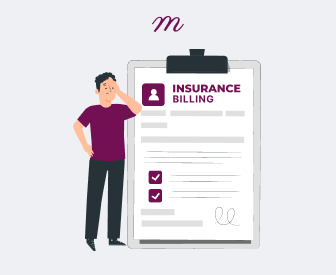Have your progress notes written for you automatically
Starting a private practice can be a challenging endeavor to take on, and as an unlicensed therapist, it may take a few extra steps. In many states, you do not have to wait until you are fully licensed start a private practice as long as you have supervision. Many unlicensed therapists decide to start their own practice as they can offer lower costs as many do not take insurance and they are able to build hours towards full licensure.
Legal Framework and Credentialing
Many unlicensed therapists have a masters degree at a minimum and are working towards obtaining their independent license. Some states offer multiple licenses with tiers, where therapists can obtain a level 1 license, however this does not deem them an independently licensed therapist. Therapists can still operate without a license and may have additional barriers for how and what they treat and supervision requirements to ensure quality services. Therapists without a license do run a greater risk if they are not supported by their licensing board, so it is important to consider the areas of practice you are willing to do in conjunction with the scope of your practice.
As an unlicensed therapist, you can still obtain additional certifications which can strengthen your credibility. Many therapists, both unlicensed and licensed often seek trainings in common therapy interventions like cognitive-behavioral therapy, dialectal-behavioral therapy and trauma-informed therapy. To add, while licensed therapists need certain continuing education classes to remain compliance with the licensing board, there is no regulation for on-going education for unlicensed therapists. Many therapists and recipients of therapy may be hesitant to work with unlicensed therapists because of this, so it is vital to engage with on-going continuing education to bolster your credentials as an unlicensed therapist.
Defining Practice Areas and Services
It is important to consider who you will treat and what you will treat. As an unlicensed therapist, you may have a harder time getting clients with complex psychosocial needs as many look for licensed and highly credentialed therapists. Considering the needs of your target clientele is the first step in defining your niche areas. It may be important to consider broad issues with therapy modalities that are accessible for all to begin with, and hone your practice further as you become more established.
Many unlicensed therapists often work with mood disorders and relationship dynamics to begin as those areas of practice can reach many potential clients. Ensuring you are as open as possible will help you become established, and having a focus in your modality of practice will help establish credibility. There are other areas of work unlicensed therapists can do as well including health and wellness coaching. This area of work is distinctly separate from traditional counseling and involved more structure for clients and has a greater focus on goal-oriented progress versus processing of emotions and experiences to move forward. (2)
Pricing out services as an unlicensed therapist will also take some time to consider based on the services you offer and your qualifications against market value. It is encouraged all unlicensed and licensed therapists do research on current trends and consider where and how one may obtain reimbursements for services or grants to help subsidize services for low-income populations. Sliding scale fee structures are often very successful and accessible for all.
Online vs In-Person Business
While you are considering your niche areas, it is important to think about how unlicensed therapists will treat their clients. Some practice solely virtually and offer online sessions where some are only in-person or hybrid. Think about how you as an unlicensed therapist will reach your clients and what the demands are for the services you are offering, and where the greater opportunity is. Online services can reduce overhead costs however it can be harder to establish as opposed to a brick and mortar location. Both can be successful, so it is important to think about your goals for your business and obtain the appropriate location and permits, including potential malpractice insurance. It can be helpful to work with an accountant and/or an attorney who specializes in small business law.
If you are setting up an in-person practice, you will need to create an office space that is inviting and safe. The space will need to be welcoming for all and you will need to think about certain signage you may need to ensure you are practicing in compliance with the laws and regulations. You may also need to consider hiring someone to manage your calendar and appointments. Online practices reduce a lot of the overhead costs in physical structure, however you may also need to invest in software programs that help track billing, appointments and scheduling. It is encouraged you consider creating a website and an online presence through digital marketing.
Marketing Your Practice
When thinking about opening your own practice, you have to consider a marketing plan and ensure your business can be profitable and sustainable. Creating a brand and establishing yourself prior to obtaining clients can be a good way to begin to get your name out there. You can create a website and utilize SEO best practices to help get your practice’s name listed in search results. Networking online and in person can also be great ways to expand your name and brand.
When you do have a set of clients and a full case load, it is important to consider the cadence of your sessions and ensure you keep room open for additional clients on a rolling basis. This is one of the best ways to remain open to new clients is helping clients discontinue services when goals are met. This can be a way to encourage client referrals or obtain testimonials to attract new clients who may be dealing with similar issues. Knowing how to scale the growth of your practice will take time depending on your target audience and overall business goals.
Ethical Considerations
Regardless of what your services are and where you offer services, you must always set clear limits and boundaries with clients. This is vital to ensuring they are getting the most out of the services and we must make sure their best interests are always the priority. It is possible that clients may present with one issue and that can lead into other areas of concern. When this happens, often we aim to serve all of their needs, however it is important to know our own professional limits on our scope of practice. We may not be the best clinician or coach to handle certain issues, and we must disclose this to our clients and support them in getting connected to services that can better support their needs. Knowing if and when to refer out is just as much of a responsibility as it is to take care of the clients under our services.
When clients are coming to you and share certain things about their lives, there is a defined understanding of confidentiality practices that must be followed. However, if clients are disclosing ideas of harm to themselves or others, it is also important that these concerns are address and the proper state-specific regulations are followed for reporting. However you are keeping your notes also must maintain high level of confidentiality and data protection. Working with an attorney who works in medical malpractice may be a helpful resource in ensuring your practice is set up appropriately and aligned with legal best practices.
Conclusion
Opening a private practice as an unlicensed therapist can be tricky but it is manageable with the right planning and tools. Working on setting up a clear niche and structure of your practice are the first steps. Both in-person and online options can be viable and sustainable, and each can offer different pros and cons, so consider all of them before making a decision. Understanding the legal and ethical aspects of your practice, scope and abilities as an unlicensed therapist is also very important to ensure you are providing services in an ethical manner that is aligned with your range of work. Speaking with a licensing board to understand what your state specifically does not allow without a license can be a good place to start. The creative aspects of opening your own practice lies in the marketing plan. This will be where many spend a lot of time to help them get their first few clients and managing that demand for marketing to support a growth trajectory will be a balancing act. As scary as starting this new venture can be, it is also incredibly exciting to build something of your own and work for yourself. Do the research and take the risk, it is usually worth it to do so.
References
1: Boldrini, T., Schiano Lomoriello, A., Del Corno, F., Lingiardi, V., & Salcuni, S. (2020). Psychotherapy during COVID-19: How the clinical practice of Italian psychotherapists changed during the pandemic. Frontiers in psychology, 11, 591170.
2: Nwafor, D., & Okoye Chukwuemeka, A. F. (2020). Psychotherapy And Private Practice: Why We Are Still Lagging Behind. International Journal for Psychotherapy in Africa, 2(1).
3: Jurcik, T., Jarvis, G. E., Zeleskov Doric, J., Krasavtseva, Y., Yaltonskaya, A., Ogiwara, K., … & Grigoryan, K. (2021). Adapting mental health services to the COVID-19 pandemic: reflections from professionals in four countries. Counselling Psychology Quarterly, 34(3-4), 649-675.
4: Rathenau, S., Sousa, D., Vaz, A., & Geller, S. (2022). The effect of attitudes toward online therapy and the difficulties perceived in online therapeutic presence. Journal of Psychotherapy Integration, 32(1), 19.
5: Grove, M. (2022). Marketing and branding for counseling interns and residents in private practice.
6: Hall, M. A., Bobinski, M. A., Orentlicher, D., Cohen, I. G., Bagley, N., & Sawicki, N. N. (2024). Health care law and ethics. Aspen Publishing.










